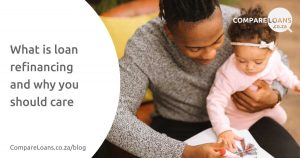How to get a loan when you are blacklisted
So you want a loan, but you’re blacklisted? You may be having a big “Oops” moment, but don’t kick yourself too hard. You might still be able to get the loan you want. That’s because, despite what most people think, blacklisting does not mean lenders have cancelled you forever or your name is on a list somewhere.
It simply means your credit report contains some negative information. For instance, you may have missed some of your payments or have a court judgement against you. Again – don’t worry too much. It happens to the best of us. Sometimes the economic situation in the country gets tight, and most South Africans find it increasingly difficult to keep paying off their loans.
However, as long as you only borrow what you can afford and make every effort to repay your debt on time, being blacklisted is a “fixable” offence. With this in mind, let’s look at how to get a loan when you’re blacklisted in South Africa.
How do you know if you’re blacklisted?
The best way to know if you’re blacklisted is by checking your credit report. The good news is, South Africans have a right to one free credit report copy per year. This is available from any major credit bureau, such as TransUnion or Experian. Typically, information on your credit report that means you’re blacklisted includes:
- Defaults – Default listings usually suggest that your debt is in the hands of debt collectors or lawyers. In some cases, the credit provider who reported you may still have the debt.
- Court judgements – This shows that the lender has taken legal action against you, and it’s a pretty serious offense.
- Debt administration – This is a legal process where your existing loan instalments and interest are reduced, and your lenders are paid once every three months. It also involves you getting help from a Debt Administrator.
- Debt review – This is another legal process where a debt counselor helps you negotiate and restructure your loan repayments and extend your loan term.
- Sequestration – This is when you have to sell off your assets, such as a car, home, or furniture, to pay off your debts.
So, what are the effects of being blacklisted?
Remember, when you apply for a loan, the lender does a hard credit check. In other words, they look at the information in your credit report, and if they see any of the negative information above, your loan application may be rejected.
Worse, it may take as long as five years to get rid of negative information in your credit file. However, it doesn’t mean that you won’t be able to get a loan during this entire time. It may just be a little or a lot difficult, depending on the nature of the negative situation.
Before we look at some of the actions you can take after being blacklisted, here’s an essential piece of advice.
If you ever find yourself struggling to pay off your loan, talk to your credit provider as soon as possible.
Often they’re willing to come up with a more affordable payment plan. But if you skip payments while being quiet about it, the lender will report you to credit bureaus, and once this negative information shows up in your credit file, the damage is much harder to reverse.
What to do if you’re blacklisted
As mentioned earlier, the first thing to do if you suspect you’re blacklisted is to check your credit report. In the future, make a point to do this before a loan application instead of after a rejection. Though you only get one free report per year, you can still access your credit history for a reasonably small fee.
Another reason to check your credit report is to avoid online loan scammers that use scare tactics to get money out of you. If you know exactly what’s in your credit report, you won’t easily fall for it.
Moving on, once you discover you’re on the blacklist, the best thing you can do to improve your chances of loan approval is to repair your credit score.
How to improve your credit score
Here’s a quick rundown of what to do if you want to improve your credit score:
- Fix credit report errors. If your credit report contains information you disagree with or if there’s fraudulent and suspicious activity against your name, you can contact the relevant credit bureau to get it fixed. If this doesn’t work after 20 business days, the Credit Ombud can help resolve the dispute.
- Settle your debts. Pay off any outstanding amounts associated with default listings or court judgements in your credit report. Once you settle these debts, notify the credit bureau as soon as possible to get the listing removed. However, note that a record of the listing may remain on your credit report for years afterwards.
- Reduce your credit card balances. This lowers your credit utilisation rate. In other words, the amount of credit you’re using should be less than the available credit. According to experts, a credit utilization rate of below 30% makes you an attractive borrower. For instance, if your credit card has a limit of R10,000, it’s best to only use R3,000.
- Pay your bills on time. The good news is, credit bureaus not only post negative information in your credit report, but they also record positive information. Therefore, the best way to repair your credit score and improve your risk profile is to make repayments on time.
- Give it time. Unfortunately, undoing the effects of blacklisting takes time. As your payment history becomes more positive with time, your credit score will start improving, You’ll eventually be able to qualify for more loans.
Are there loans for the blacklisted?
Some South African lenders offer loans for blacklisted people. These loans generally have higher interest rates because of the higher risk you pose to the lender.
Additionally, you may not be able to get the loan you need if you are under debt review, debt administration, or going through sequestration. In any case, you’re more likely to get approval for the following loans if your name is on the “blacklist”:
- Debt consolidation loans. Debt consolidation loans are for people with multiple loans who want to manage them under a single account that requires a single repayment. In some cases, consolidating debt helps you reduce borrowing costs.
- Secured loans. This can be secured personal loans or secured car loans that require collateral, such as your car, home, or other valuable property. The lender is more willing to offer you a loan since they can repossess your asset if you fail to make repayments.
- Payday loans. Payday loans are short-term loans that need to be paid off quickly and often come with super high interest rates. Some lenders advertise these types of loans as “no credit check loans,” so blacklisted people may be able to qualify.
- Co-signed loans. Co-signed loans involve asking someone who isn’t blacklisted and has a better credit score to co-sign your loan application. This person will have to take over the loan payments if you default, so make sure they understand this before they agree.
Final Word
It’s possible to get a loan after blacklisting. The important thing is to check your credit report, fix errors, and improve your borrowing behaviour to clear your name and get it off the blacklist.
Remember to only borrow what you can afford and make an effort to build an emergency fund. That way, you don’t always have to apply for a loan when faced with a difficult financial situation. Lastly, don’t hesitate to seek professional advice if you need help clearing your credit record.
Latest posts

Why was my loan application rejected?
23.08.2020

What is loan refinancing and why you should care
23.09.2020

What is financial responsibility and how to achieve it
24.11.2020
